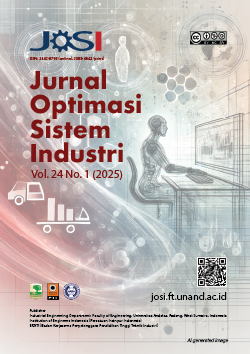JOSI Vol. 24 No. 1 (June 2025)
Posted on 2025-07-01
We are pleased to present Volume 24, Issue 1 of the Jurnal Optimasi Sistem Industri, officially published on June 30, 2025. This issue comprises a diverse and compelling selection of articles that reflect the journal’s commitment to advancing the science and practice of industrial systems optimization, particularly through interdisciplinary and data-driven approaches.
The articles featured in this issue originate from researchers across Indonesia, Thailand, Malaysia, China, and Belgium, affirming JOSI’s role as a scholarly platform with growing international reach and collaboration. The topics covered in this issue are closely aligned with JOSI’s core focus—namely, operations research, supply chain management, sustainable systems, ergonomics, decision support systems, and soft systems thinking—while also contributing meaningfully to the United Nations Sustainable Development Goals (SDGs), especially SDG 9 (Industry, Innovation, and Infrastructure), SDG 12 (Responsible Consumption and Production), and SDG 3 (Good Health and Well-being).
One article introduces a hybrid framework that combines Ergo-VSM, the Analytic Hierarchy Process (AHP), and a Traffic Light System to assess ergonomic performance in peanut processing lines. Conducted in Indonesia and Taiwan, this work highlights the practical integration of lean tools and human factors engineering to improve worker well-being and operational efficiency.
Another study from Thailand and Belgium proposes a heuristic algorithm for full-truckload vehicle routing in intermodal logistics under time window constraints. By quantifying the impact of temporal characteristics such as concentration and specialization, the research enhances the understanding of transportation planning under uncertainty—a critical area in sustainable logistics optimization.
An interdisciplinary collaboration from Indonesia and Malaysia offers a robust model for sustainable supplier selection in healthcare. By integrating fuzzy multi-criteria decision-making with Grey Forecasting, the authors develop a method that balances economic, social, and environmental priorities, providing actionable insights for healthcare procurement and resilience planning.
Throughout this issue, contributors employ a wide range of analytical methods, including deterministic annealing, fuzzy logic, machine learning, and value stream mapping. These methodological contributions not only align with JOSI’s emphasis on optimization and decision support but also extend the literature by addressing real-world complexities in industrial and service systems.
We thank our authors, reviewers, and editorial team for their contributions to this publication. We hope that the insights offered in this issue will inspire further research and innovation in optimizing industrial systems to be more sustainable, inclusive, and human-centered.
Editor-in-Chief
Jurnal Optimasi Sistem Industri
